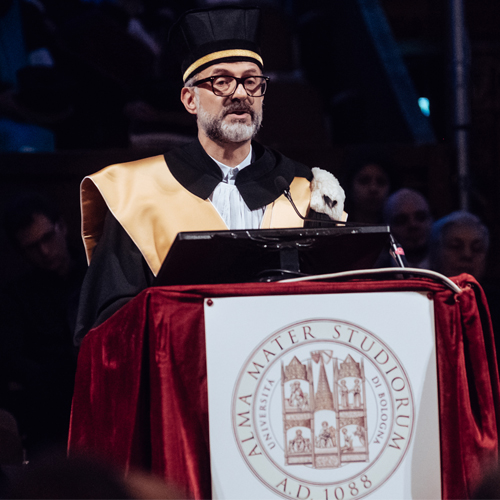
Honorary degree to Massimo Bottura: “Handle the unexpected”
16 February 2017An honorary degree is considered the most solemn event for Alma Mater Studiorum. On Monday February 6th in Santa Lucia Aula Magna, this important honor was granted to Massimo Bottura, chef and entrepreneur.
He was able to combine the art of gastronomy and entrepreneurial skills. A path that Bottura remembers as complex, dotted with sacrifices and disappointments at first. “An enterprise that was born in the area of Modena, with three people in the kitchen and, after a relevant experience in New York, went through big dreams. Nothing though could have prepared me to the surprises I was going to encounter during this journey.”
Bottura recalls for us the steps that made up his enterprise.“Osteria Francescana has become a sort of Renaissance workshop, because many come to us, from all over the world, in order to understand what a style is. We create culture, we look at the past critically and not with nostalgia, to ferry the best of tradition to the future. We established an alliance with farmers, breeders, cheese-makers, the fishermen that allow us to convey emotions through their best raw materials. We’ve become their ambassadors. Then with tourism, that brings some people to spend two, three days in the area where we’re located to understand the territory and piece together at the Osteria Francescana a thought that also features gastronomy. And the social aspect: if one is awarded all possible prizes, one must be able to give back generously.” An idea of social responsibility that is not charity, but masterfully organized and productive. In a project like Refettorio Ambrosiano, established in the framework of Expo and one that continued in the Brazilian favelas, the concept isn’t just to feed, but to offer food culture to those who have no access to it.
Nowadays, about 40 people work for Osteria Francescana. “Small enterprises that make up the economic structure of Italy often are confronted with insurmountable impediments on the road to internationalization, but Osteria Francescana found its own path in the globalized world, thanks to its unique ability to transform dinner in a restaurant into an exciting experience from the sensory and intellectual points of view, based on the combination of memory, territory, art, design and cultures” professor Massimo Bergami, BBS Dean, highlighted during his laudatio that preceded the awarding of the business administration honorary degree to Massimo Bottura. “From the business viewpoint, Bottura implemented a deliberate growth strategy, aimed at the development of quality and international visibility, through vision, entrepreneurial skills, establishing the team and managing it, product innovation and attention paid to service.”
“I believe the most important ingredient is culture” Massimo Bottura told us. “The advice I give to every young person is to study more and wait before entering the kitchen, because only through culture you can fully express yourself.” A belief that leads us to a difficult present situation. “A young entrepreneur needs to have dreams, but right now, in Italy, there’s a huge identity crisis and everyone’s afraid. I could have enjoyed a wealthy life. I abandoned everything and put myself to the test. The door had opened: it could have been music, art. I went through a kitchen door instead. Leaving the door open for unexpected things is fundamental in life, as you never know what may happen, and it’s the greatest thing. I strongly believe the important thing is being able to handle the unexpected.”
The audience that gathered in Santa Lucia featured VIPs who came to pay a sincere tribute to the great chef. Among the large crowd there were several of Bottura’s colleagues, just to mention a few: Cristina Bowerman, Moreno Cedroni, Massimo Spigaroli, Mauro Uliassi. We asked Davide Oldani, whose work method has become a case history at Harvard Business School, if success can start off from a classroom. “It’s important to keep on talking about School because it’s the first time in life when people apply themselves to life itself. I believe that we’re craftsmen first and then entrepreneurs. Our job is made of organization, it creates jobs, it allows young people to fall in love with something concrete. And young people know that learning about this idea of craftsmanship in the right context is an excellent investment for the future”.
